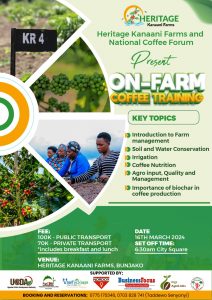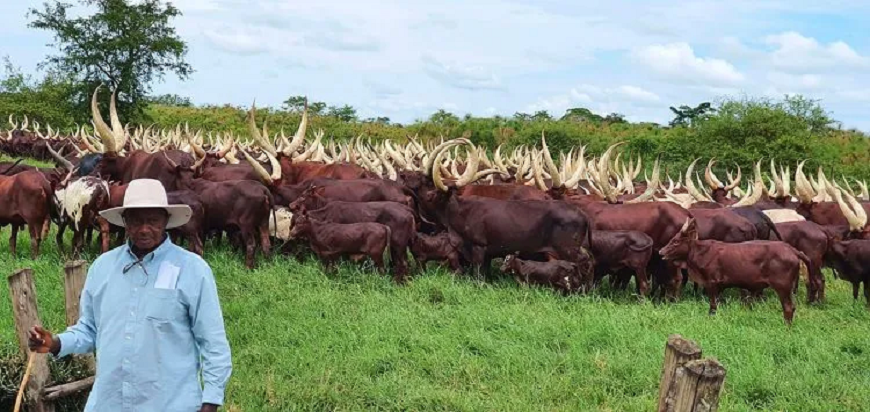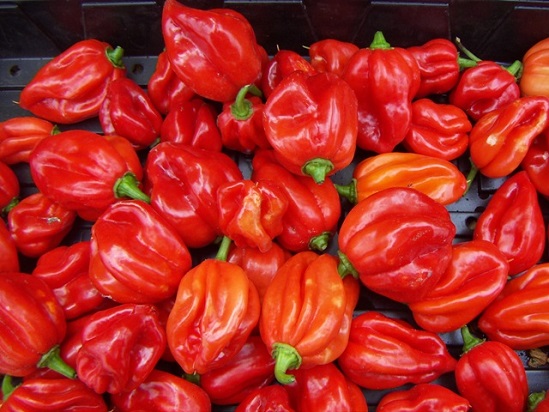Denis Okello is earning big from coffee farming
Northern Uganda is increasingly becoming a new centre for coffee farming as more farmers embrace the cash crop.
Traditionally, Northern region has not been part of the known coffee growing areas in Uganda.
However, in 2014, Government through Uganda Coffee Development Authority (UCDA) started a nationwide campaign to replant coffee and increase production which had stalled at 3.5 million bags.
UCDA introduced commercial coffee production in the non-traditional commercial coffee areas including the Mid-Northern Uganda districts of Apac, Gulu, Kitgum, Lira, Pader, Oyam, Amolatar, Dokolo and Amuru. Coffee production has since picked up in the region. Reports indicate that the Acholi sub-region is currently producing over 500,000 bags of coffee every year.
Denis Okello, a coffee model farmer in Adyaka village, Agali Sub County in Lira district, is one of the farmers who’s slowly turning away from cotton growing for coffee farming.

His journey
Okello was previously known for growing cotton, rice, soya beans and sunflower.
However, after the government’s continuous message on growing coffee, Okello got convinced and in 2017, he started with Robusta Elite seedlings on 4.5 acres. His coffee has performed well and is changing the narrative on coffee farming in the region.
“I still grow the other crops, but I am paying special attention to coffee,” says Okello.
In his first harvest in 2021, he harvested 58 bags of dry cherries and earned over Shs10 million.
“I didn’t think I would be making this kind of money from coffee,” Okello confessed in an interview with Business Focus.
In 2022, he planted four more acres of Coffee Wilt Disease Resistant varieties commonly called KR varieties, bringing his total acreage under coffee to 8.5 acres. Okello plans to have over 10 acres of coffee.
According to Okello’s assessment, coffee is a good crop and does well depending on the weather. With good weather, Okello says he is sure of a bumper harvest.
“After 58 bags in 2021, it dropped to 20 bags in 2022 due to prolonged dry spell. However, I am currently anticipating more than 60 bags this season,” Okello says.
He says coffee requires patience, explaining why many farmers in his area are yet to embrace it.
Okello uses trees to provide shade to his crops.
“These are very critical,” he says, adding: “My coffee is under a forests of sorts.”
Plans for irrigation
Okello has just constructed a dam in preparation to start irrigating his coffee. Previously, he was using bicycles to carry water from the stream. “This broke so many bicycles,” says Okello. However, he says that with the dam now in place, he plans to easily irrigate his coffee.
“My trenches are well-dug out,” says Okello, adding: “My coffee will no longer die because of water stress.”
‘I don’t Use Fertilizers’
Interestingly, Okello does not use fertilizers. The last time he applied fertilizer was when the government supplied farmers with organic fertilizers. “My plants did so well,” he says. But after that, he has not been applying any fertilizer. He only mulches with residues from simsim and soya beans.
Land remains an issue
Okello says limited land is prohibiting farmers in his area from growing coffee.
“Because of the growing population, land has reduced. So, people have smaller pieces of land. That means, you can’t grow coffee. So, people tend to grow food crops rather than coffee. I am growing coffee because I have land,” says Okello.
He however notes that farmers are slowly embracing coffee, especially after visiting his farm.
“When farmers see what I am doing, they get inspired. With the PDM, many successes will be registered in coffee farming,” he adds.
He advises farmers to embrace coffee growing.
“You don’t need a lot of land. Clonal coffee is very good. Start and you will be amazed,” says Okello.
More sources of money
Okello also has bee hives that give him honey. The hives are placed under the the coffee trees.
“During pollination, the bees don’t look elsewhere,” he says.
From the dam, he says, he will have fish.
“Next to the dam, I will grow vegetables like tomatoes, onions and cabbages,” Okello says.
Appeal to UCDA
Okello urges UCDA to give out plantlets to farmers early.
“Give us plantlets early for early planting. If they come in February or March, it is the best compared to when it comes in September or August. Also, once in a while, come and visit us. Some farmers are lazy, but once you visit the farmers, they become serious. Otherwise, our current extension worker is the best. He deserves a promotion,“ he says.





